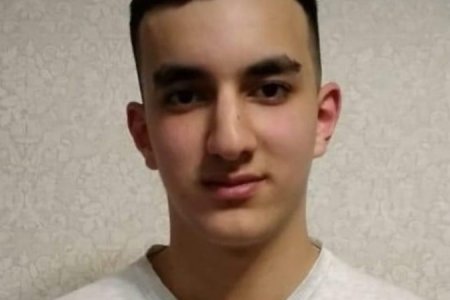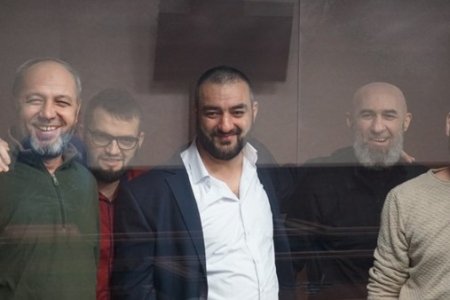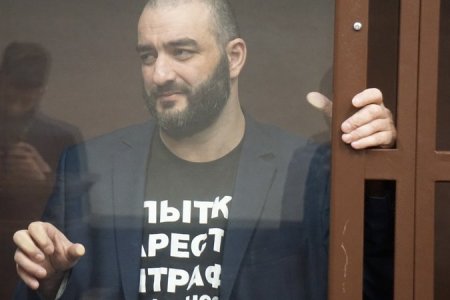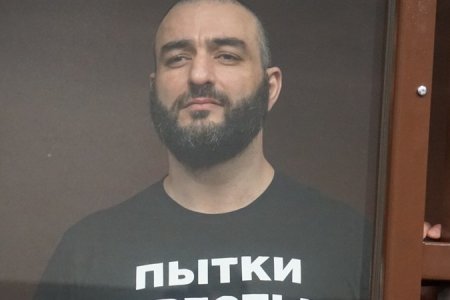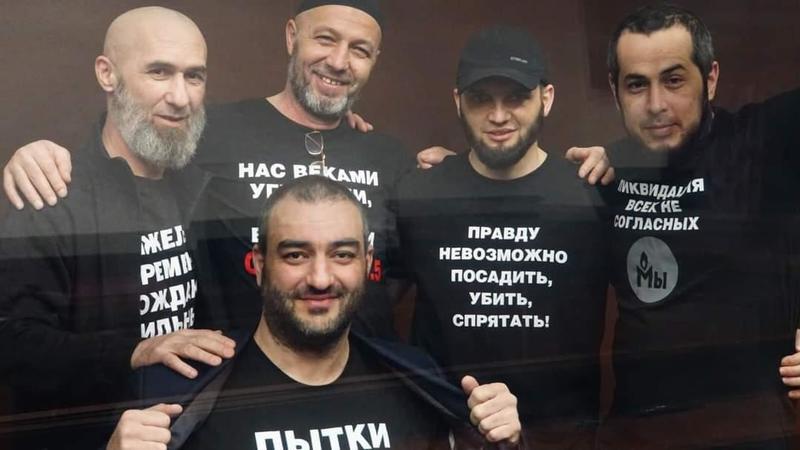
Five Crimean Tatar civic activists have been sentenced to 12 and 14 years’ imprisonment without any crime and solely on the basis of ‘anonymous witnesses’ who very likely did not even know the men on trial. As lawyer Emil Kurbedinov noted, the sentences were predictable, with the last eight years having left no illusions about the Russian ‘justice’ system. That, however, is of no comfort to the families of the men, especially their children, whose childhood has been shattered. The smallest of these children, Sulbiye, was born after her father, Medzhit Abdurakhmanov. If Russia has its way, she will be 12 when her father, a recognized political prisoner, is released.
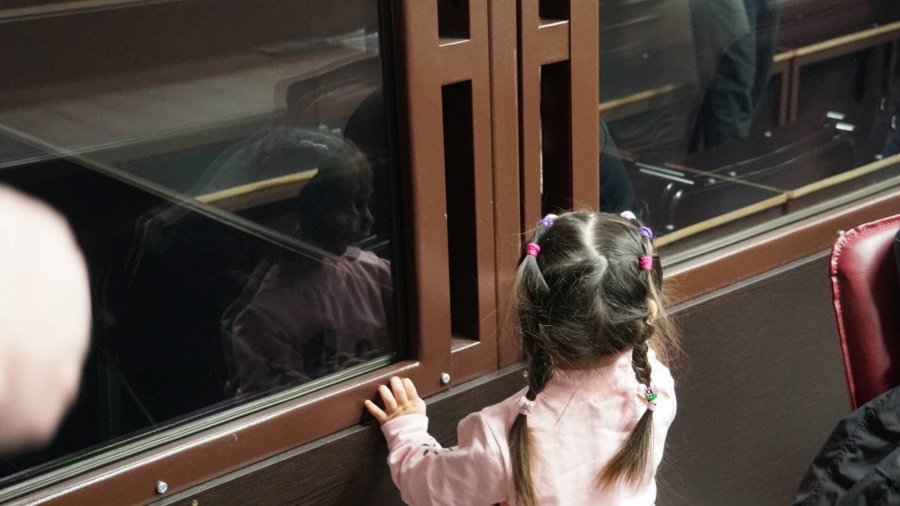
Sulbiye turned four on 30 April. According to her mother, Elmira, the little girl has come with her to almost all of the hearings over the last year. She gets angry at the “mean” court guards when they refuse to allow her to approach her father in the ‘aquarium’ [or effective cage]. That’s my babaka (daddy), she says, why aren’t they letting me see him?
There may well be occasions where isolation, even in court, is required. Here, the reason is purely that Russia is fabricating these trials out of nothing, and wants to maintain the pretence that this is not a politically motivated prosecution with an essentially predetermined sentence.
Medzhit Abdurakhmanov; Tofik Abdulgaziev; Vladlen Abdulkadyrov; Izzet Abdullayev and Bilyal Adilov were all arrested on 27 March 2019 in the worst attack to date on Crimean Tatar civic activists and journalists, in particular from the Crimean Solidarity human rights initiative.
International condemnation
The arrests and the men’s ongoing imprisonment have been condemned by the international community, as has the fact that Russia is clearly targeting people with a strong civic position. Human Rights Watch, for example, stated that “the sweeping arrests in Crimea aim to portray politically active Crimean Tatars as terrorists as a way to silence them”. In recognizing all 25 men as political prisoners, the Memorial Human Rights Centre stressed that Russia was trying in this way to destroy the Crimean Tatar human rights movement. The men’s release has been demanded by, among others, the European Parliament and US State Department. All of this has been repeatedly pointed out in court, as has the undoubted fact that Russia is violating international law, in particular, the Fourth Geneva Convention which prohibits Russia from applying its legislation on occupied territory and from forcibly deporting Crimeans to Russian territory.
The charges
All of the men are charged only with ‘involvement’ in the Hizb ut-Tahrir movement, a peaceful transnational Muslim party which is legal in Ukraine and which is not known to have carried out acts of terrorism anywhere in the world. Russia has never provided any grounds for its highly secretive 2003 Supreme Court ruling that declared Hizb ut-Tahrir ‘terrorist’, yet this inexplicable ruling is now being used as justification for huge sentences on supposed ‘terrorism charges’. Five men, including well-known journalist Remzi Bekirov, faced the more serious charge of ‘organizing’ a Hizb ut-Tahrir group (Article 205.5 § 1 of Russia’s criminal code).
The country which invaded and annexed Crimea has also charged the 25 Ukrainian citizens with “planning a violent seizure of power and change in Russia’s constitutional order” (Article 278). This charge has also become standard, although not one of the armed searches of the men’s homes found any weapons, and there is no evidence at all of any plans to commit violence.
The prosecution split the ‘trial’ up into five separate cloned trials, making it considerably harder to follow the proceedings and ensure international attention.
‘Evidence’
Although men are charged under Russian terrorism legislation, literally the only proof officially needed is of ‘involvement’ in an organization that is legal in Ukraine and entirely non-violent.
Even with the bar so very low, it can sink lower since no real evidence is even required. All 25 men faced charges based on illicitly taped and innocuous discussions about religion, politics, and, in this case, courage. Although the men were all arrested in the first half of 2019, the conversations had been taped for or by the FSB back in early 2016. Such a huge delay makes the ‘terrorism’ charges seem especially cynical. Transcripts of these conversations are then sent to FSB-loyal ‘experts’ who essentially provide the opinion demanded of them. Independent expert assessments have provided detailed explanations for their scathing criticism of such opinions, but these are invariably ignored by the court.
The FSB have also taken to making these copy-paste prosecutions even easier for themselves by arriving at the supposed ‘searches’ with the ‘prohibited religious literature’ that they then claim to have found. Tofik Abdulgaziev told the court how the FSB had planted such literature in a place outside (near the dog kennel) where no devout Muslim would ever leave religious books.
Even without the defendants’ insistence that such books were planted, the court could hardly base sentences of from 12 – 14 years’ in the worst Russian prisons on such material alone. Nor do the taped conversations help since, however the FSB-loyal ‘experts’ may try, the discussions were innocuous.
The prosecution therefore uses ‘secret’ or ‘anonymous witnesses’, despite the lack of any proof that these alleged ‘witnesses’ would be in danger were their identity to be revealed. There is considerable evidence that ‘anonymous witnesses’ are often people who have themselves been tortured and / or threatened with imprisonment if they do not collaborate with the FSB. It is invariably these alleged witnesses who claim to have heard the defendants admit to being members of Hizb ut-Tahrir , or similar. They almost always claim to remember particular ‘incriminating conversations’ while demonstrating total ‘amnesia’ about everything else. In the last report on occupied Crimea from UN Secretary General Antonio Guterres , there was particular criticism of Russian convictions based almost exclusively on anonymous testimony, and of the role played by Russian judges in upholding such practice and preventing the defence from exposing the flaws in this alleged ‘testimony’.
Court and sentences
There is simply no possibility that prosecutor Yury Konstantinovich Nesterov, and the three judges from the notorious Southern District Military Court in Rostov-on-Don (Russia): Rizvan Zubairov (presiding) Maxim Nikitin, Roman Saprunov are unaware that they taking part in a shocking travesty of justice.
Yet on 12 May 2022, those three judges found all five men ‘guilty’ as charged. They sentenced:
Bilyal Adilov (b. 1970), a builder and civic activist to 14 years’ imprisonment and then 18 months restricted liberty.
12-year sentences, with a subsequent year’s restricted liberty were passed on:
Tofik Abdulgaziev (b. 1981), a sound technician and Crimean Solidarity activist.
Vladlen Abdulkadyrov (b. 1979), a mobile communications technician, who actively helped organize food parcels for political prisoners.
Izet Abdullayev (b. 1986), a gas and electric welder, who also attended politically-motivated court hearings. His second child was also born after his arrest.
Medzhit Abdurakhmanov (b. 1975), a carpenter and builder, and also a Crimean Solidarity activist.
In all cases, the first five years of the sentence would be in a prison, the harshest of Russian penal institutions, with the rest in harsh-regime prison colonies.
An appeal will, of course, be lodged.
PLEASE WRITE TO THE MEN!
The letters tell them they are not forgotten, and show Moscow that the ‘trial’ now underway is being followed.
Letters need to be in Russian, and on ‘safe’ subjects. If that is a problem, use the sample letter below (copying it by hand), perhaps adding a picture or photo. Do add a return address so that the men can answer.
Sample letter
Привет,
Желаю Вам здоровья, мужества и терпения, надеюсь на скорое освобождение. Простите, что мало пишу – мне трудно писать по-русски, но мы все о Вас помним.
[Hi. I wish you good health, courage and patience and hope that you will soon be released. I’m sorry that this letter is short – it’s hard for me to write in Russian., but you are not forgotten. ]
Addresses
Tofik Abdulgaziev,
344022 Russian Federation, Rostov on the Don, 219 Maxim Gorky St, SIZO-1
Abdulgaziev, Tofik Sultanovych, b. 1981
Vladlen Abdulkadyrov
344022 Russian Federation, Rostov on the Don, 219 Maxim Gorky St, SIZO-1
Abdulkadyrov, Vladlen Vasilyevych, b. 1979
Izzet Abdullayev
344022 Russian Federation, Rostov on the Don, 219 Maxim Gorky St, SIZO-1
Abdullayev, Izet Mustafayevych, b. 1986
Medzhit Abdurakhmanov
344022 Russian Federation, Rostov on the Don, 219 Maxim Gorky St, SIZO-1
Abdurakhmanov, Medzhit Anafiyevych, b. 1975
Bilyal Adilov
344022 Russian Federation, Rostov on the Don, 219 Maxim Gorky St, SIZO-1
Adilov, Bilyal Abdurakhmanovych, b. 1970
